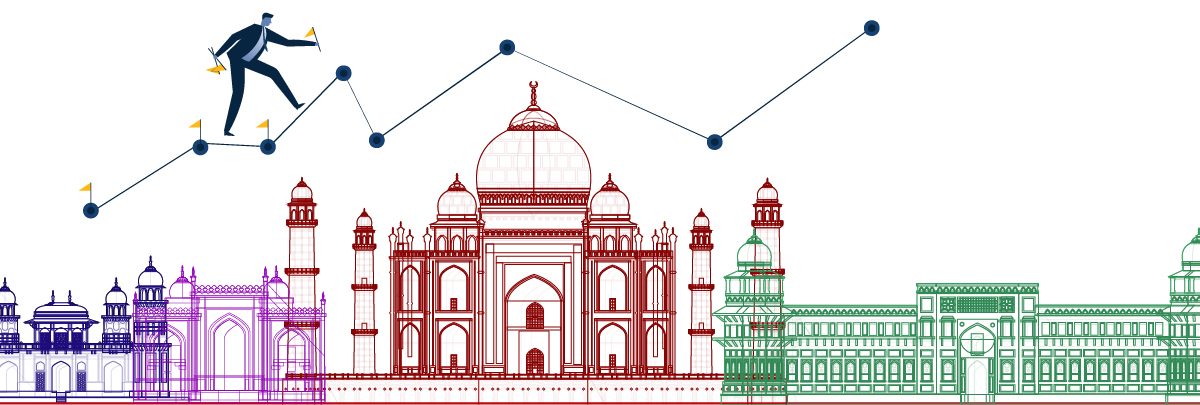Becoming a certified ERM professional can be a pathbreaking achievement and exemplifies a strong understanding of risk identification, risk assessment, and mitigation strategies for a range of complex risk events across sectors. The IRM’s 5-level certification track starts with the Level 1 Foundation Exam, progressing to Level 2 International Certificate in General ERM v/s Financial Services ERM and designation ‘IRMCert’, then moving to Level 3 International Diploma in Risk Management entitling you to the designation ‘GradIRM’ and at par with an International Masters, with Level 4 giving you the Certified Membership status and ‘CMIRM’ designation and Level 5 being the highest grade in Enterprise Risk Management education i.e. Certified Fellowship or the ‘CFIRM’ designation.
Qualifications required for enterprise risk management in Agra
In order to start a career in enterprise risk management and register for the Level 1 Foundation Student Examination, you need to have passed 12th grade and then you can pursue Levels 1 and 2 alongside your undergraduation. Level 3 can be pursued after graduation and Level 4 and 5 can be earned by experience.
Working professionals who are graduates can directly enrol for the Level 1 Foundation Professional Examination or Level 2 examination depending on their experience in risk management
Why enterprise risk management is right for you?
Risk is part of every business, from the pandemic to cyber threats to supply chain disruptions. The risks facing organisations are real, and there is increasing demand for qualified and skilled professionals who can help improve organisational resilience in an ever-evolving global landscape. Enterprise Risk Management (ERM) is an integrated and joined-up approach to managing risk across all departments of an organization (irrespective of any sector) and its extended networks.
Our qualifications are recognised globally as the industry standard in ERM. The curriculum for IRM’s global ERM examinations and certifications is periodically updated and reflects the new and evolving risk era we are in, ensuring our students are up-to-date with the latest best practices across sectors and areas of risk including international frameworks (like ISO 31000 and COSO 2004 and 2017), risk identification techniques, scenario planning, horizon scanning, evaluation of emerging risks, risk appetite and tolerance, risk treatment, risk reporting and communication, business continuity planning, internal audit and assurance and corporate governance. You will gain global skills like complex problem-solving, analytical thinking, negotiation and risk-based decision-making. These skills will help you develop, adapt, and implement robust risk mitigation strategies to improve any company’s or your own venture’s resilience and also develop yourself as a certified risk consultant if you wish to set up your own risk advisory.
What fundamentals does ERM cover?
IRM’s Global Level 1 Enterprise Risk Management (ERM) Examination is the first step towards starting a career in ERM with the world’s leading professional body.
The Level 1 ERM Exam is relevant for aspiring risk leaders, entrepreneurs, family business owners, risk champions, risk consultants, process owners, functional experts, or business heads. Students from any background can pursue the ERM exam considering the wide coverage of risks (i.e. finance, technology, legal, accounting, operations, management studies, and more) and the rising importance of risk intelligence as an important skill.
The Level 1 Examination covers the foundational knowledge that organisations expect as well as the critical risk identification and mitigation skills that professionals need to respond to complex uncertain events impacting all departments of an organisation that include marketing, human resources, procurement, supply chain, information technology, cyber security, sales, legal, research & development, environmental, social, governance (ESG) and many more. The curriculum empowers you with the theory and practice of enterprise risk management in-line with ISO 31000 standards, COSO framework, and industry best applications with a combination of case studies, applied exercises, and current affairs.
Additionally, outsourced services, IT security, supplier assessments, joint ventures and partnerships, alliances, and informal arrangements, together with the speed of change can all present challenges to organisations today. The Level 1 curriculum now also covers the study of the Extended Enterprise. Extended Enterprise looks at how all organisations are affected by the way that others in their value chain and network manage risk and the complexities that can arise from these relationships. It aims to study the complex network of relationships that underpin public and private economic activity in modern economies.
With the Foundation ERM Exam, you will learn to manage risks across the enterprise which is now an inherent part of delivering organisational success. The more deeply a risk-intelligent professional succeeds in influencing the organisation’s entire culture, the greater their ability to influence how risks are identified and acted upon with the right mitigation strategies. Using the principles of enterprise risk management and aligning the ERM process with general management, candidates can develop the strong knowledge required for risk-based decision-making.
How can you start a career in enterprise risk management in Agra?
You can start a career with the India Affiliate of Institute of Risk Management, the world’s leading professional body in Enterprise Risk Management exams across 140 countries since 1986. IRM has 360 exam centres in India.
What are the fees and exam dates in Agra?
The Level 1 online exam is conducted 4 times a year (Feb / May / Aug / Nov) and the fee is INR 29,500 including GST and all study materials. The Level 2 exam is conducted twice a year (June / Nov) and the fee is INR 183,340 including GST and materials. The Level 3 project-based exam runs throughout the year and depends on when you’re ready to apply. Levels 4 and 5 are memberships. Chief Risk Officers/ Risk Leaders can directly apply for Level 4 via the Senior Executive Route.
Quick Links:
Certification Track: Click here
Level 1: Click here
Level 2: Click here
Level 3: Click here
Level 4: Click here














